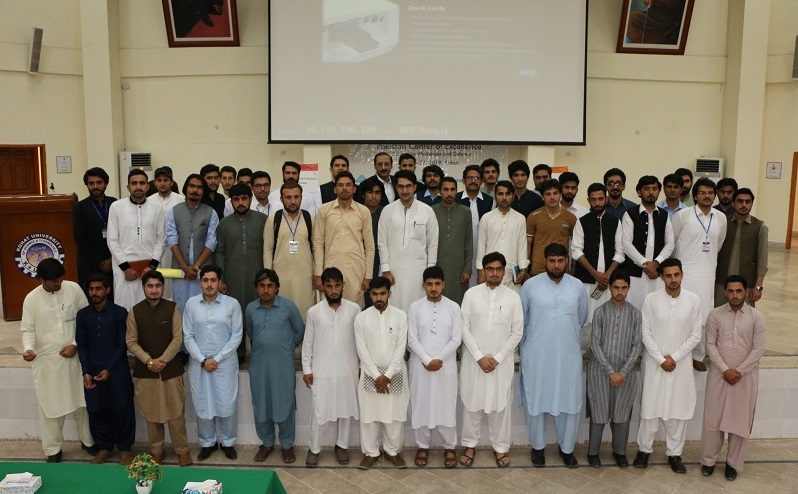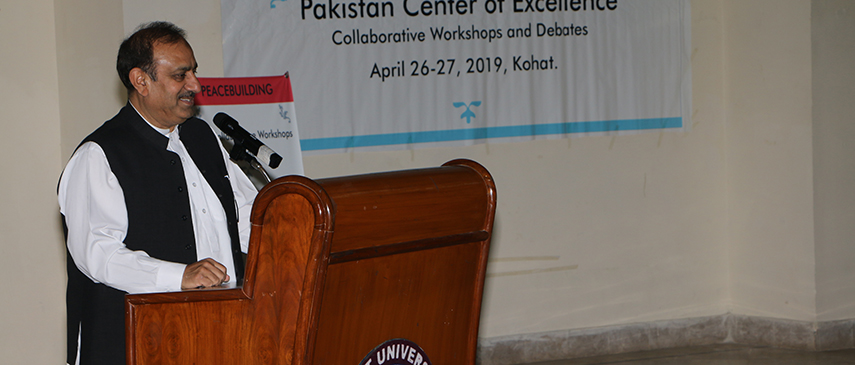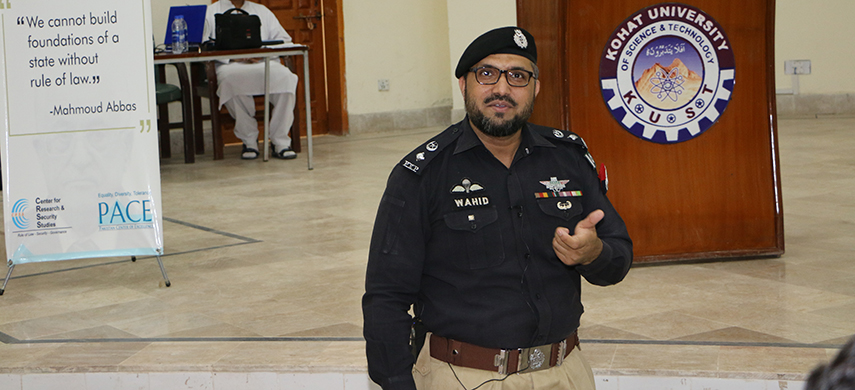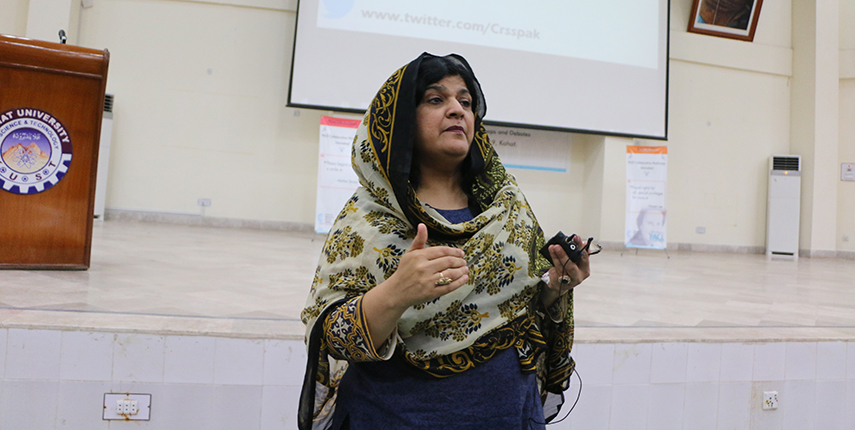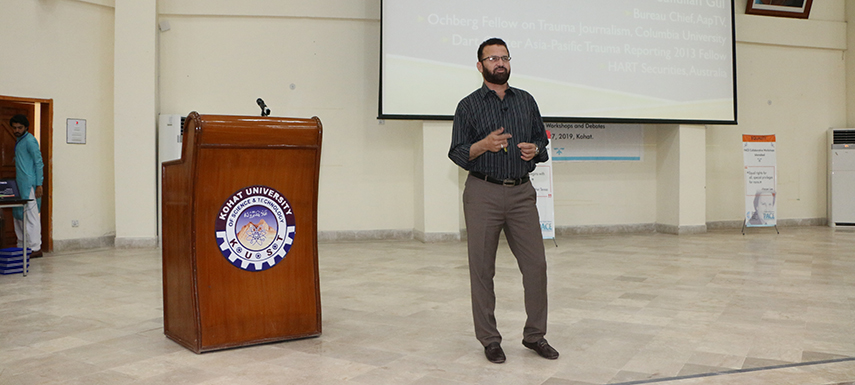The Center for Research and Security Studies (CRSS) conducted the fourth two-day PACE Collaborative workshops and debates for young university students, on April 26-27, 2019, in Kohat. The workshop was held at Kohat University of Science and Technology, Kohat. The workshop was conducted under the umbrella of the Pakistan Center of Excellence (PACE), a counter-radicalization, pluralistic values focused project, in collaboration with the Dutch Government.
Participants included young students from Kohat University of Science and Technology, Kohat and FATA University, FR Kohat. Project Manager, Ms. Farhana Kanwal started off the workshop with an introductory session and welcomed the participants to the workshop. Ms. Kanwal said that PACE is a counter radicalization initiative by CRSS which was in September 2015 and completed its first phase in September 2018. The core objective of PACE is to indoctrinate the habit of questioning and critical thinking among youth of Pakistan. PACE encourages to point at preconceived narratives and notions and embed the national discourse in constitutionalism and the rule of law. She further described that how important is the concept of equal citizenry and its implementation in today’s Pakistan. She stressed on adopting the framework of equal citizenry and that is the only way we can come up as a rational nation internationally. A state’s responsibility is to protect its citizens rather making the laws which create a segregation among them and this is where discrimination starts. A state is not supposed to view its citizens through the prism of religion as it leads to disparities among the people. Ms. Farhana elaborated on the success and achievements of PACE in its first phase and also the objectives of PACE Evolution.
The Vice Chancellor Professor Dr. Jamil Ahmed of Kohat University of Science and Technology, Kohat, expressed his immense over conducting PACE Collaborative Workshop on their campus. He said that the purpose of such activities is to enhance the importance of the process of peace building. Actually, it is a process of creating trust among various groups of society. It is a process of strengthening a society’s capacity to manage conflicts in a non-conflicting way. It is a long process which aims at changing the attitudes and behaviours of the people.
The VC further expressed his views saying that he really appreciates the idea of discussing rule of law as mainly people believe in talking about their rights and the responsibilities of the citizen of Pakistan. He said that rules exist to enable humans to interact with one another on equal basis with discrimination. The application of rules starts at individual level ultimately leading to a law abiding society. The Constitution of Pakistan says that all the citizens are equal and as Pakistanis we all need to go through this document so that we can understand the importance of basic rights for all. We have town this document and start applying the things mentioned in it for greater benefit of society and state. The rules are supposed to be followed whether we like it or not. From this point, I urge the youth of Pakistan to understand the importance of rule of law and equality and start application of these laws in their daily lives. He elucidated that a successful state is where all the citizens can interact with one another without any fear of being judged for their beliefs. As citizens of Pakistan, we should acknowledge the importance of equal citizenry for all and regard it.
The second session of the workshop was kicked off by DPO Kohat Mr. Wahid Mehmood who shared his views on ‘Rule of Law’ with young students. He held an interactive session saying that we can’t ensure the rule of law unless we are aware of our responsibilities as citizen of Pakistan. Rule of law id directly connected to our responsibilities. He gave an insight on that normally we don’t like to be dictated in our daily lives and therefore end up breaking the rules which is a negative behaviour. Rule of law is just abiding by the rules and regulations which are made up to run a society and state smoothly. The main responsibility of police is the prevention and detection of the crime but they can’t do it without public cooperation. The biggest dilemma in our society is that we are not ready to accept our responsibilities. Ensuring the rule of law is a collective responsibility of public and both and together we can lead to a law abiding society. Sharing the responsibility is the basic rule of citizenship.
The third session of the day started by Ms. Shagufta Khalique on ‘Conflict Resolution and Peace Building Approaches’. She elaborated on the context, behaviour and attitude model of conflict with students. Tolerance and patience are the two main components which can lead us to a peaceful society. She further elaborated that peace has two aspects; internal and external. If a person is internally peaceful, his mind and heart don’t support conflicting and violent behaviour that person will automatically be a messenger of peace. However, on the other hand, person with believe in violence and aggression will damage the society by only wanting himself to be accepted and respected. Internal satisfaction makes a difference and impacts the environment. Peacebuilding is a mechanism and it starts where the war or conflict has ended and then where there is already an ideal situation but you try to refine the situation. Conflict resolution and peacebuilding go hand in hand. Conflict is basically a disagreement or difference of opinion in simplest its simplest form which can be based on resources, emotions and so many other things. Conflict is natural and it exists since forever; however, we need to minimize the negative impacts of the conflict by resolving and understanding its nature it through peaceful means.
Mr. Safiullah Gul is an acclaimed journalist and his session was based on ‘Media Ethics.’ He gave an insight on reporting and journalism and how crucial it is to report facts and the credibility of the information are the foundations of good journalism. He criticised immature journalism and how it spreads chaos rather than information. He explained how a story should be neutral explaining both sides. Sensationalism should be avoided and self-censorship should be considered. Biased and abusive attitude should not be accepted. He stressed on the importance of being neutral and presenting authentic news.
Ms. Farhana Kanwal closed the session with highlighting the importance of debates and critical thinking. She said that debate is a way of identifying and discussing the issues with logic and reason. She further said that an ideal society would always look beyond differences and there will be respect of rights and opinions for all with no discrimination.

